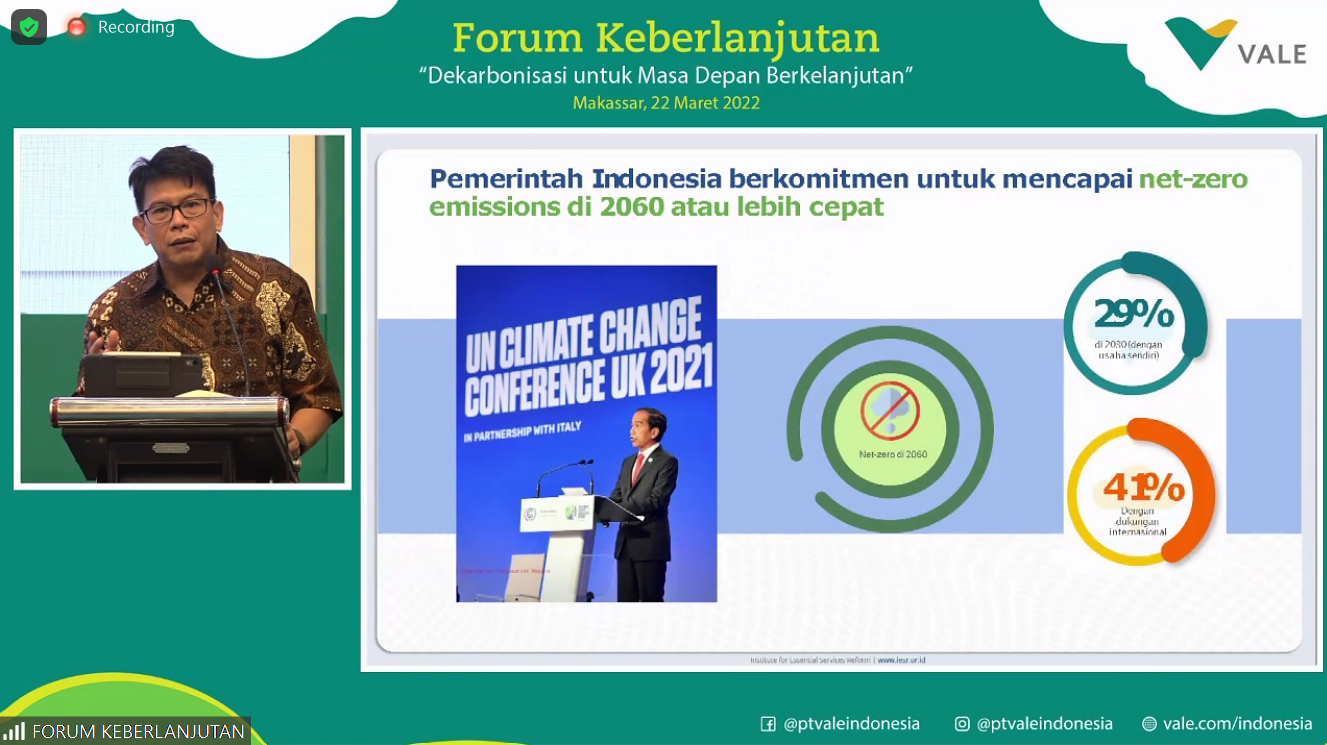Makassar, 22 March 2022 – Accelerating the use of clean energy is a fundamental point in ensuring the future of the economy and other sectors is maintained in the context of sustainability. This was raised in the Sustainability Forum held by PT Vale Indonesia Tbk on Tuesday (22/03). The activity raised the theme “Decarbonization for a Sustainable Future.”
In this activity, the Executive Director of the Institute for Essential Services Reform (IESR), Fabby Tumiwa, said that the transition to fossil-based energy is necessary for the ambition of net-zero emission (NZE) can become a necessity, with an estimated realization in 2050. He emphasized that the step, which is often called decarbonization, must be in line with the target of the Paris Agreement, which is to limit the increase in the earth’s temperature to 1.5 degrees Celsius. If there is no planned decarbonization effort, it is projected that the energy sector will become the largest emitter in Indonesia by 2030 and make it difficult to achieve the Paris Agreement targets.
“In 2022, the government and all stakeholders must strive to increase the use of renewable energy and promote energy efficiency in buildings and industry. By 2025, the government must achieve the target of 23% of the renewable energy mix, and after that, it must pursue the energy sector’s emissions to reach their peak before 2030. So indeed, there must be an acceleration of the transition to clean energy with decarbonization. In the long term, this will have a multiplier effect on the competitiveness of our economy so that it is more optimal,” he said.
Fabby views South Sulawesi as one of the regions in the country that is already in an energy transition system with a significant mix of renewable energy. This is indicated by constructing renewable energy-based plants such as wind, water, and solar power. As a result, the clean energy mix is already at around 30% of the installed capacity in South Sulawesi. This achievement is considered inseparable from the collaboration of all elements, which have begun to be relatively aggressive in implementing decarbonization steps in the production process, including PT Vale Indonesia Tbk.
“I think this is excellent. PT Vale itself already has a 33 percent decarbonization roadmap for 2030 and targets net-zero in 2050. But for the 2050 stage, there is still a need for further assessments,” said Fabby.
On the same occasion, the Director-General of New Renewable Energy and Energy Conversion (EBTKE) of the Ministry of Energy and Mineral Resources, Dadan Kusdiana, said that the government had prepared a roadmap for the energy transition to carbon-neutral, which is projected to reach the optimal point in 2060.
“We are targeting energy decarbonization towards Net Zero Emission 2060 or even faster. This is because the new renewable energy mix (EBT) was already fully achieved, reducing 1,562 million tons of CO2 emissions,” he said.
To achieve the target of the EBT mix, Dadan explained, there are several acceleration efforts carried out by the government, starting from the completion of the Draft Presidential Regulation on EBT Prices, the application of the ESDM Regulation of PLTS Roof No. 26 of 2021, then mandatory biofuels to the provision of fiscal and non-fiscal incentives for NRE.
“Then, of course, the ease of licensing for the EBT segment to encourage demand for electrical energy in several primary activities even on a personal scale in the community,” said Dadan.
Meanwhile, President Director of PT Vale Indonesia, Febriany Eddy, explained the company, which operates in the mining sector, has also developed a road map to reduce carbon emissions for scopes 1 and 2 to a third in 2030 and net zero in 2050.
“For the plan for a new smelter in Central Sulawesi, we, with partners from China, have committed to using LNG instead of coal for power generation there,” he said.
The Governor of South Sulawesi, Andi Sudirman, through the Governor’s Expert Staff for Government Affairs, Andi Mappatoba, conveyed that the existence of PT Vale consistently practices sustainability and efforts to reduce the greenhouse effect through decarbonization steps helped the government in realizing low-carbon development.
“PT Vale has tried to contribute to the environmental, social, and economic sustainability of South Sulawesi with all its sustainability measures. In the future, hopefully, we will always be partners with the provincial government in developing the economy and carbon-neutral targets as announced by the government.”

